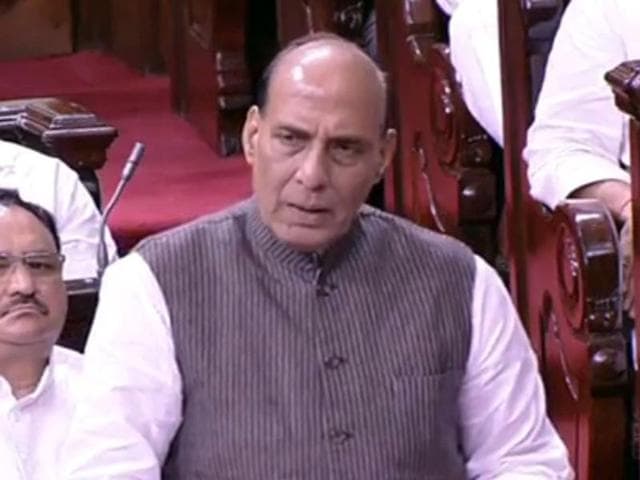Rajnath says govt will ‘talk to all’ about Kashmir, all-party meet on Aug 12
In a bipartisan discussion over the violent unrest in Kashmir, most politicians from across the spectrum on Wednesday urged the government to work out a political solution and bring peace to the Valley.
The Centre agreed to an all-party meeting on Friday to discuss how to end weeks of violent unrest in Kashmir, as pressure mounted on the government to open a broad dialogue to resolve the crisis triggered by the killing of a militant leader.

Home minister Rajnath Singh also said a decision could be taken on sending an all-party delegation to Kashmir after discussions with the state chief minister on the terms and modalities of engagement.
He said the government will “talk to all no doubt”, responding to opposition queries on whether “moderates, political parties and others” will be included in the dialogue. He, however, ruled out discussing Kashmir with Pakistan.
Read | All-party meeting to discuss Kashmir situation on August 12
“Kashmir is an inseparable part of India. No power on earth can separate it from India,” Singh said while replying to the debate in the upper house.
“Talks would not be held with Pakistan regarding Kashmir but on the issue of Pakistan Occupied Kashmir,” he added, saying pro-Pakistani slogans “won’t be tolerated” on Indian territory.
At least 55 people have been killed – most of them in police firing – following street unrest in Kashmir to protest against the killing of Hizbul Mujahideen commander Burhan Wani by security forces last month. The region has been under curfew for 33 days.
Wednesday’s announcements came a day after Prime Minister Narendra Modi invoked his predecessor Atal Bihari Vajpayee’s moderate vision to outline his government’s stand on dealing with the protests in Kashmir. In 2003, Vajpayee paved the way for the Centre’s first-ever talks with Kashmiri separatists and laid down three principles to deal with the region’s political crisis -- Insaaniyat (humanism), Jamhooriyat (democracy) and Kashmiriyat (Kashmir’s legacy of amity).
Read | Kashmir has the same freedom that any other Indian state enjoys: Modi
The government’s decision to hold an all-party meeting is seen aimed at blunting opposition criticism in Rajya Sabha that Modi’s outreach to Kashmir was not genuine and that the government was reluctant to talk to all stakeholders in the region.
On Wednesday, Rajya Sabha saw an impassioned debate over Kashmir and the house unanimously adopted a resolution, appealing “to all sections of the society in Jammu and Kashmir to work for the early restoration of normalcy and harmony and… restore the confidence among the people in general and youth in particular”.
Later, RS deputy chairperson PJ Kurien clarified the resolution would include a suggestion from CPI-M leader Sitaram Yechury that confidence building measures will come through a “process of dialogue” in Delhi and Kashmir. It wasn’t clear if that would include the separatist Hurriyat leaders to whom Vajpayee had reached out.
Way Forward
Past efforts at finding political solutions in Kashmir, including the initiatives by Vajpayee, yielded little results. In 2010, Prime Minister Manmohan Singh sent a three-member team of interlocutors to the region but their recommendations were largely ignored.
Political experts see Modi’s outreach to Kashmir – after a long silence -- and the Centre’s latest stand as a sign of nervousness in the government that the region might have reached a tipping point.
“Like Atal Bihari Vajpayee, he (Modi) should admit that there is a problem and address that,” Professor Gull Mohammad Wani of Kashmir University said.
“Dialogue with separatists will definitely help. They have a separate constituency and can influence people. Nobody can ignore that.”
Noor Ahmad Baba, political science professor of Kashmir University, agrees.
“It requires more than symbolism and mere expressions to address the current unrest as past experiences have shown. Dialogue at various levels is imperative,” he said.
“Stopping the use of pellet guns will be a good beginning.”
But others feel the intensity of the ongoing protests, by and large spontaneous, will not sustain.
“Fatigue will eventually set in but that doesn’t mean the issue will go. If not addressed, it will keep recurring in different forms and manifestations,” said another political analyst, requesting anonymity.





